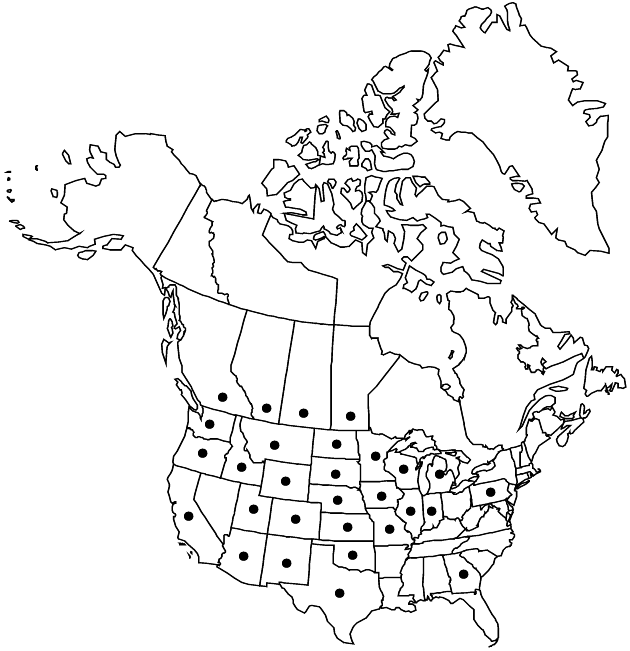Difference between revisions of "Cirsium undulatum"
Syst. Veg. 3: 374. 1826.
imported>Volume Importer |
imported>Volume Importer |
||
| Line 62: | Line 62: | ||
|publication year=1826 | |publication year=1826 | ||
|special status= | |special status= | ||
| − | |source xml=https:// | + | |source xml=https://bitbucket.org/aafc-mbb/fna-data-curation/src/2e0870ddd59836b60bcf96646a41e87ea5a5943a/coarse_grained_fna_xml/V19-20-21/V19_75.xml |
|tribe=Asteraceae tribe Cardueae | |tribe=Asteraceae tribe Cardueae | ||
|genus=Cirsium | |genus=Cirsium | ||
Latest revision as of 19:55, 5 November 2020
Perennials, 20–230 cm; deeply seated runner roots that produce adventitious buds. Stems 1–several, erect or ascending, densely gray-tomentose; branches 0–few, usually above middle, ascending. Leaves: blades elliptic to oblong or ovate, 10–40 × 1–10 cm, margins strongly undulate, coarsely dentate or shallowly to deeply lobed, lobes ascending to spreading, ± triangular, well separated to closely spaced, spinulose and coarsely dentate or usually cleft into 2–3 lanceolate to triangular, often entire-margined, spine-tipped divisions, main spines (yellowish), 2–12+ mm, abaxial densely gray-tomentose, adaxial faces thinly tomentose; basal sometimes present at flowering, winged-petiolate; principal cauline becoming sessile and progressively reduced distally, widest at base, bases ± auriculate-clasping to short-decurrent; distal reduced, spinier. Heads 1–10+, terminal on branches, in leafy, ± corymbiform arrays. Peduncles 0–25+ cm. Involucres ovoid to hemispheric or broadly campanulate, 2.5–4.5 × 1.5–4.5 cm, loosely arachnoid on phyllary margins or glabrate. Phyllaries in 8–12 series, imbricate, ovate to lanceolate (outer) to linear-lanceolate (inner), abaxial faces with prominent glutinous ridge; outer and middle appressed, spines spreading, 1.5–5 mm; apices of inner narrow, often flexuous, flat, ± entire, spineless or weakly spiny. Corollas lavender to pink, purple, or white, 24–50 mm, tubes 12–28 mm, throats 6–14 mm, lobes 6.5–13 mm; style tips 5–7.5 mm. Cypselae light to dark brown, 6–7 mm, bodies and apical collars concolorous, narrow; pappi 20–38 mm (usually scabridulous). 2n = 26.
Phenology: Flowering spring–autumn (May–Oct).
Habitat: Mixedgrass prairie, shortgrass prairie, Palouse prairie, sagebrush deserts, pinyon-juniper woodlands, openings in montane coniferous forests, often in disturbed areas
Elevation: 100–2800 m
Distribution

Alta., B.C., Man., Sask., Ariz., Calif., Colo., Ga., Idaho, Ill., Ind., Iowa, Kans., Mich., Minn., Mo., Mont., Nebr., N.Mex., N.Dak., Okla., Oreg., Pa., S.Dak., Tex., Utah, Wash., Wis., Wyo., Mexico (Chihuahua, Coahuila, Durango, Sonora).
Discussion
Cirsium undulatum is widely distributed in the wstern half of North America from the dry plains and plateaus of the Pacific Northwest eastward across the Great Plains to Manitoba and the Dakotas and south to Texas, New Mexico, and northwestern Mexico. It occurs in scattered localities in the Rocky Mountains and northeastern Great Basin region. At least some of the few widely scattered records from the eastern United States are probably introductions. Cirsium undulatum is both widespread and variable. Plants of the Great Plains region tend to be low-growing with a few large heads and elongate corollas. Plants of the Pacific Northwest are usually taller and produce smaller, more numerous heads with shorter corollas. A detailed study of this species might reveal races worthy of recognition as infraspecific taxa.
Wavyleaf thistle is listed by California as a noxious weed. However, most reports of Cirsium undulatum in California are based upon misidentifications of C. canescens. Cirsium undulatum is known to hybridize with C. flodmanii, C. hookerianum, and C. scariosum var. coloradense. J. T. Howell (1960b) reported that C. undulatum was suspected to hybridize with C. brevifolium in the Pacific Northwest.
Selected References
None.